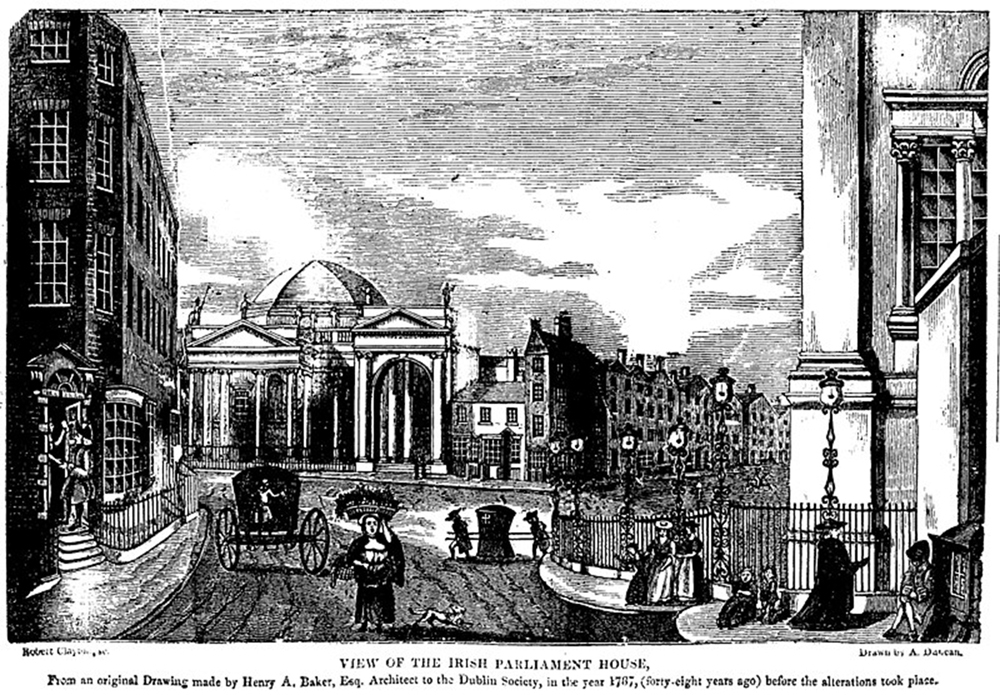 Menu
Menu
 Menu
Menu
In theory Ireland was a kingdom co-equal to England. In reality it was not.
Ireland’s history is a story of colonization. Following 300 years of Viking incursions, the Anglo-Normans invaded Ireland in 1169. This invasion marked the beginning of 850 years of English involvement in Ireland. During these years, England often used Ireland’s presence in the British Empire to advance English—not Irish—interests. Countless laws were enacted that benefited England but hamstringed the Irish economy and harmed Irish citizens.
During Jonathan Swift’s time, Ireland was particularly oppressed by England. The 17th and 18th centuries were a time of expanding global trade and commerce. As trade and commerce expanded, so too did Irish wealth. This did not sit well with English merchants and traders who viewed Ireland’s newfound prosperity as their loss. So the English parliament created laws to redirect Irish trade and wealth to England.
In the realm of trade, England passed the Navigation Acts. These laws restricted trade activities of English colonies, which particularly hurt Ireland. As well, England targeted key Irish industries. In 1665, strict prohibitions were placed on importing Irish cattle and meat. In 1699, the Woollen Act restricted Irish wool exports to a handful of English ports.
England also drained Ireland of money through taxes, profiteering, and rents paid to absentee landlords. Exact figures are unknown, but economic historians have validated Jonathan Swift’s claim in A Short View of the State of Ireland that nearly half of Ireland’s annual income was being sent to England.
Even Irish currency was the subject of English interference. In 1722, Englishman William Wood bought a patent to produce Ireland’s halfpennies. The deal—made without the consent of the Irish parliament—caused a currency panic in Ireland, as rumours spread that Wood was counterfeiting his own currency. Public uproar convinced the English government to cancel Wood’s patent. However, as compensation Wood was granted an annual £3,000 pension that was secretly paid from Irish tax revenues.
The Anglo-Irish could not do much about interference from London because England had curbed the power of Ireland’s parliament. Poynings’ Law, which dated back to 1495, required that any meeting of the Irish Parliament and all Irish legislation be pre-approved by England. By Swift’s time, Irish legislators had found convoluted ways to get around Poynings’ Law, so England passed the Declaratory Act in 1720. The act removed the Irish House of Lords as the Irish Supreme Court, and granted England the power to create Ireland’s laws. These changes gave England ultimate power over Ireland.

Irish Parliament House. Drawn by Henry Baker (1787) and published in the Dublin Penny Journal, 1835.
Sadly, the Anglo-Irish elite often took out their frustration with English oppression from above by oppressing the native Irish population below. With England’s approval, the Irish Parliament passed laws that discriminated against Irish Catholics and to a lesser-extent Irish Presbyterians.
For example, education for Catholic children was strictly restricted under the Penal Laws of 1695. Even though Catholics were the majority, they were not allowed to run for office. Catholics even lost the right to vote under the Disenfranchisement Act of 1728. And to help ensure that they stayed poor, Catholics were barred from owning land.
It is little wonder that Swift said in A Modest Proposal that “instead of being able to work for their honest livelihood, [the Catholic poor were] forced to employ all their time in strolling to beg for sustenance.” Laws and policies created by the English and the Anglo-Irish hit Ireland’s poor Catholic majority the hardest. Catholics were discriminated against by landlords, they could not vote, they could not run for office, and they could not go to school. They had almost nothing left but reliance upon acts of charity.
England believed that it best-knew how to run Ireland. As Jonathan Swift wrote in A Proposal for the Universal Use of Irish Manufacture, Ireland was nothing more to England than “one of their colonies of outcasts in America.” At the time, England considered its North American colonies to be backwater hinterlands.
Swift’s belief that Ireland was treated like a backwater American colony helps explain why A Modest Proposal’s baby-eating proposition came from “a very knowing American of my acquaintance in London.” At the time it was believed that North America’s Indigenous people were cannibals. If the Irish were treated like outcast Americans, they may as well start acting like Americans and be cannibals.
In fact, because Swift tried to give his proposal credibility by saying it was an American idea, he was making a statement about just how low Ireland’s place was in the British Empire. Consider:
Because the idea originated with an American in London—and not an Irish person—Swift was suggesting that the English held outcast Americans in higher esteem than their Irish neighbours.